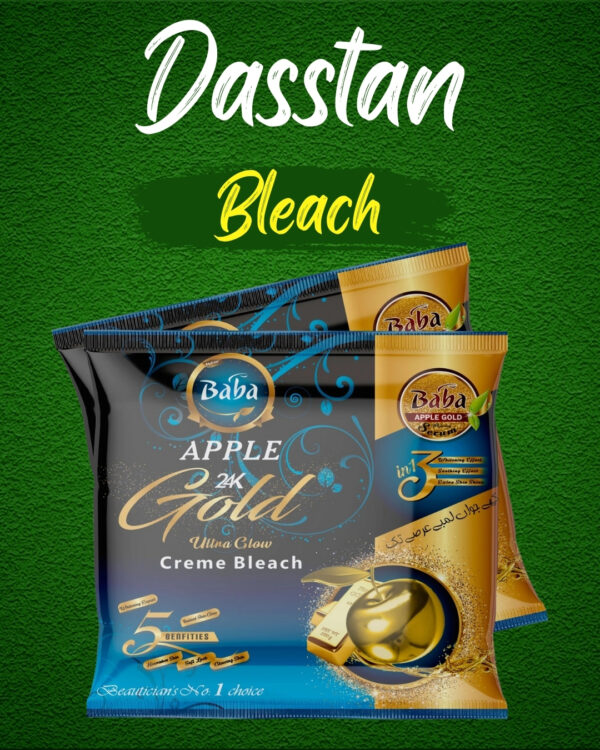Description
Apple Gold Bleach: A Deep Dive into its Claims, Concerns, and Alternatives
Apple Gold Bleach is a popular, readily available skin lightening product that promises a brighter, more radiant complexion. It’s often marketed for its ability to reduce the appearance of dark spots, facial hair, and dullness. However, like many bleaching products, it comes with potential risks and side effects. This comprehensive description aims to provide a balanced overview, addressing its claims, ingredients, potential hazards, and safer alternatives.
Understanding the Appeal: The Promise of Instant Radiance
Apple Gold Bleach is popular due to its perceived ability to deliver quick results. Its marketing often emphasizes:
- Instant Skin Lightening: Reducing the visibility of dark spots, blemishes, and hyperpigmentation.
- Facial Hair Bleaching: Making unwanted facial hair less noticeable.
- Enhanced Glow: Providing a brighter, more luminous complexion.
- Affordability and Accessibility: Widely available at low prices, making it accessible to a broad consumer base.
- “Gold” and “Apple” as marketing terms: These words give the impression of a luxurious and natural product.
Decoding the Ingredients: What’s Really Inside?
The effectiveness of Apple Gold Bleach relies on its chemical composition, which typically includes:
- Hydrogen Peroxide: The primary bleaching agent, responsible for lightening skin and hair.
- Ammonium Bicarbonate: An accelerator that boosts the bleaching process.
- Gold Particles (Often Cosmetic Grade): Primarily for marketing purposes, adding a “gold” sheen and perceived luxury. These particles have very little to no skin benefits.
- Apple Extract (Often Minimal): Used for marketing, with the actual concentration likely minimal. The benefits of apple extract in such a product are negligible.
- Other Chemicals: Fragrances, preservatives, and stabilizers, which can irritate sensitive skin.
Potential Risks and Side Effects: A Cause for Concern
The chemical nature of Apple Gold Bleach can lead to various adverse effects:
- Skin Irritation and Redness: Hydrogen peroxide and ammonium bicarbonate can cause irritation, particularly for sensitive skin.
- Chemical Burns: Prolonged or improper use can result in chemical burns, leading to pain, scarring, and discoloration.
- Increased Sensitivity to Sunlight: Bleached skin becomes more vulnerable to sun damage, increasing the risk of sunburn and hyperpigmentation.
- Uneven Skin Tone: Bleaching can sometimes result in patchy or uneven skin lightening.
- Allergic Reactions: Fragrances and other chemicals can trigger allergic reactions, causing itching, swelling, and rashes.
- Damage to the Skin Barrier: Frequent use can weaken the skin’s protective barrier, making it more susceptible to infections and other skin problems.
- Eye Damage: If the product comes into contact with the eyes, it can cause severe irritation or damage.
- Respiratory Issues: The strong fumes can cause respiratory problems, especially for people with asthma or other breathing conditions.
User Experiences and Reviews: A Mixed Bag of Results
User reviews of Apple Gold Bleach vary widely. Some users report positive results, such as lighter skin and less noticeable facial hair. However, many others experience negative side effects, including irritation, burns, and uneven skin tone. The lack of standardized testing and regulation makes it difficult to verify the accuracy of these claims.
Safer Alternatives for Skin Lightening and Hair Removal
Instead of relying on harsh bleaching products, consider these safer alternatives:
- Topical Lightening Creams: Containing ingredients like vitamin C, kojic acid, or niacinamide, which gently lighten the skin over time.
- Chemical Exfoliants: AHAs and BHAs can help to remove dead skin cells and improve skin tone.
- Laser Hair Removal: A long-term solution for reducing unwanted facial hair.
- Waxing or Threading: Temporary hair removal methods that are gentler on the skin than bleaching.
- Sunscreen: Protect your skin from sun damage, which can worsen hyperpigmentation.
- Consult a Dermatologist: A dermatologist can recommend personalized treatment options for your specific skin concerns.








Reviews
There are no reviews yet.